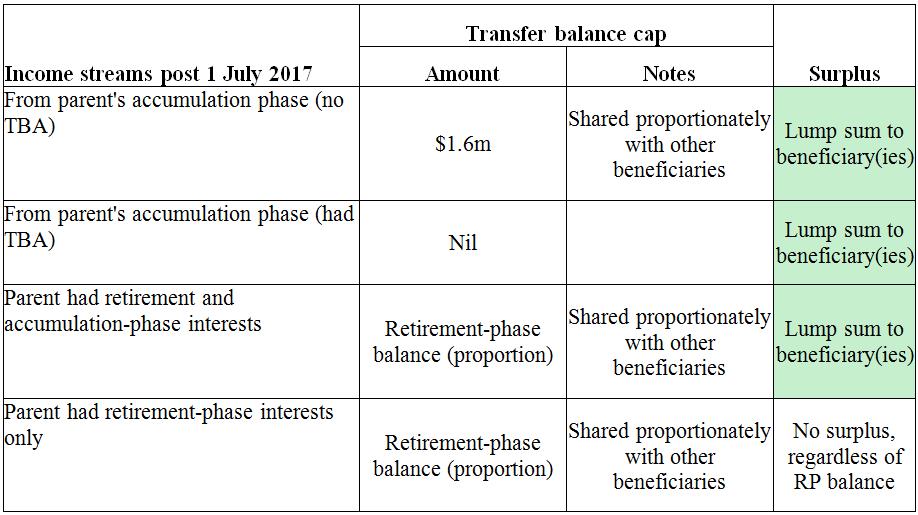A relatively unpublicised aspect of the 2017 superannuation reform legislation is the potential limitation on paying death benefit income streams to children.
The introduction of transfer balance caps (TBC) for superannuation members from 1 July 2017 included limits on the amount of income stream death benefits a dependant could receive following the death of a member.
While a lot of consideration has been given to the issue of the spouse as the beneficiary, and the impact of the TBC limits on their death benefit income stream, significantly less consideration appears to have been given to the impact of the TBC if the beneficiaries are minors.
In other words, when the benefits are to pass to underage children of the deceased member, the impact of the TBC can force the decision as to whether the benefits are paid as an income stream, whether they must be paid as a lump sum, or a combination of both.
Potential death benefit income stream beneficiaries
The Superannuation Industry (Supervision) Act limits the ability to pay death benefits as one or more income streams to the following dependants of the deceased member:
- spouse,
- children:
o aged under 18,
o aged 18 to 25 and financially dependent on the deceased,
o any age, but who have a prescribed disability,
- a person in an Interdependency relationship with the deceased, and
- a person who was financially dependent on the deceased.
Transfer balance caps
Overlaying the entitlement to receive a death benefit income stream are the TBC rules.
For all but the children of the deceased member, the TBC rules will basically limit the amount of death benefits they may receive as an income stream to the amount of ‘space’ they have available in their personal transfer balance account (TBA).
For an adult dependant, who has not previously had a TBA, that amount will be $1.6 million. For someone who already has a TBA, that amount could be more or less than $1.6 million, depending on their circumstances.
Modified transfer balance caps
Because the situation with children is different, in that their income stream will need to be paid out at age 25 at the latest (unless they suffer from a prescribed disability), different rules apply so that their TBA, when they retire, will not have been affected by any benefits they received as a child.
Unfortunately there are potentially significant downsides to the TBC rules when they are applied to child pension recipients.
Children have a modified TBC, which, in many instances, will limit the amount of capital that can be applied to commence an income stream for them.
The Explanatory Memorandum to the Treasury Laws Amendment (Fair and Sustainable Superannuation) Bill 2016 provides guidance for a range of circumstances, which are summarised in the following table:

The table indicates a significant variation in the entitlements for children, depending on the TBC of their deceased parent. For example, the bottom row indicates that, regardless of the amount of the deceased parent’s retirement-phase balance (that is possibly well in excess of $1.6 million through investment growth), the child can take that balance as an income stream.
Conversely, if the parent had previously had a TBA, but, for instance, had commuted that retirement-phase balance to accumulation (second row under heading), then the child could not take any of their benefits as an income stream.
What happens to the rest?
That is the major concern and we would hope an unintended consequence of the legislation.
Each of the top three rows indicate there is potential that benefits for underage children must be paid out of superannuation. When considering this relates to underage beneficiaries, there can be serious consequences, as the trustee could not pay the benefits directly to the children – they must be paid to someone for the benefit of the child.
Example of misuse
If we consider the example of a young girl named Cinderella, whose father, a widower, remarried. The father directed that his superannuation benefits be held for Cinderella and, because of circumstances detailed in the table above, those benefits were required to be paid out of superannuation. The trustee proceeded to pay the benefits to Cinderella’s stepmother, to be held in trust for Cinderella’s benefit. We can all imagine, given the personalities, how that would have worked for Cinderella.
Planning options
What steps should Cinderella’s father have taken to ensure the benefits passed to Cinderella on his death?
Prior to the superannuation reform changes from 1 July 2017, he could have directed the funds be paid as an income stream to her, or else directed them to a superannuation proceeds trust for her benefit.
Following the changes, a superannuation proceeds trust, with the right trustee, should have taken a higher priority.
The moral of the story – early planning will assist in ensuring the forced payment of benefits is not a waste of the beneficiary’s money.
Michael Harkin is national manager for training and advice at Topdocs.


